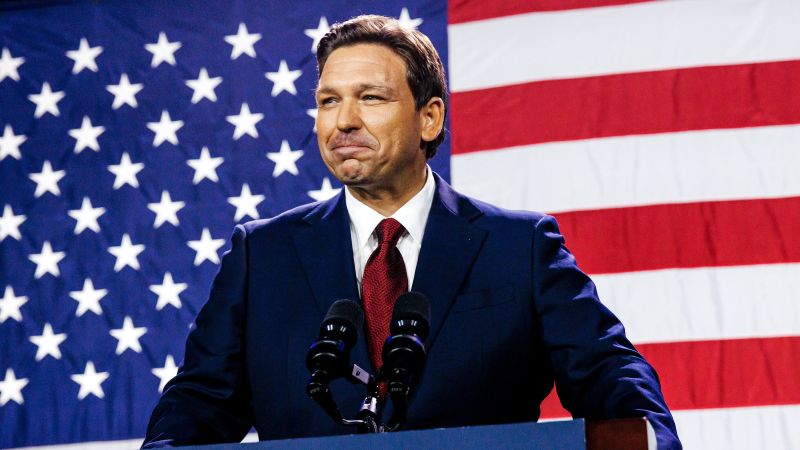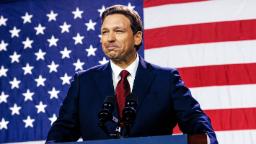

CNN
—
Florida Gov. Ron DeSantis, whose clashes with Disney and aggressive pursuit of conservative victories have made him a leading Republican Party figure, has filed to run for president in 2024.
His filing with the Federal Election Commission comes ahead of the announcement he’s set to make Wednesday evening with Twitter owner Elon Musk on the site’s audio platform, Twitter Spaces.
It makes official a decision that was widely expected since November, when DeSantis won reelection in resounding fashion and captured the attention of a party longing to turn the page from recent defeats. He steps into the race for the 2024 GOP presidential nomination later than other contenders and having failed to freeze more still from jumping in, but is better funded, better known and polling higher than all but one: Donald Trump.
The former president has treated DeSantis, whom he once endorsed for Florida governor, as his top foe for months, assailing him regularly on social media and in interviews. A super PAC aligned with Trump has spent millions attacking DeSantis on national television, setting expectations for a bruising primary between the two former allies.
To overcome Trump, DeSantis will need to convince Republican voters he is best positioned to take on President Joe Biden next November. That will likely involve winning over conservatives who may still look back fondly on Trump’s presidency while also coalescing support among Republicans eager for new blood to lead the party.
DeSantis, 44, has spent months laying the groundwork to make that case. He has traveled the country extensively, styling himself as a leader in the right’s culture wars and presenting a new vision for a Republican Party that uses elected powers to punish political opponents and force conservative orthodoxy on institutions and businesses. Working with his state’s GOP-controlled legislature, DeSantis has stacked up multiple policy victories – including banning abortion after six weeks, eliminating permits to carry a concealed gun in public, enacting a universal school voucher law and targeting access to transgender health care – all of which will serve as a platform as he launches his campaign.
“I think that (DeSantis) and former President Donald Trump, they have a lot in common, which they don’t want to hear, but I think it’s the truth,” Wisconsin voter Steve Frazier said after DeSantis spoke at a recent GOP dinner in Marathon County. “Unfortunately, they’re running possibly for the same office, and that’s a conflict for people like myself, in that we may have two very, very qualified men running for the same position.”
DeSantis has continued to generate headlines for his yearlong fight with Disney, his state’s most iconic business and a vital economic engine, over a new law that bans certain instruction about sexual orientation and gender identity in schools. After Disney put out a statement opposing the measure, DeSantis plotted a takeover of the special taxing district that allowed the entertainment giant to build its iconic theme park empire in Central Florida.
The move put Florida businesses on notice and alarmed even some in the GOP, who questioned whether elected executives should use state power to punish a company. Undeterred, DeSantis has made his clash with Disney a central part of his political story, devoting an entire chapter of his recent memoir to the saga. Disney has sued DeSantis, accusing the governor of weaponizing his political power to punish the company for exercising its free speech rights, while DeSantis has vowed not to cave.
Though eager to take on private businesses, reporters and sometimes his own party, DeSantis has largely avoided directly confronting Trump. Instead, he has opted for more subtle comparisons between their tenures in office. He has maligned the lack of action during Trump’s first four years while listing off his own accomplishments as governor. He regularly touts the lack of “drama” and “leaks” in his administration, a clear jab at the chaos that often engulfed the Trump White House.
“If I were to run, I’m running against Biden,” DeSantis said in a recent interview with British television host Piers Morgan.
That same day, though, DeSantis seemed to poke fun at Trump over his alleged affair with an adult film star that is at the heart of a Manhattan district attorney’s case against the former president.
“I don’t know what goes into paying hush money to a porn star,” he said at a news conference.
To many, DeSantis had signaled he was ready to mix it up with Trump. But a week later, as Trump was indicted, DeSantis backed off and instead criticized the prosecutor who filed the charges.
The walkback was illustrative of Republican struggles to challenge Trump head-on that date back to the 2016 presidential primary. The former president’s GOP rivals have often opted instead to target the contender perceived as the biggest threat to overcoming Trump: DeSantis. Already, 2024 hopefuls such as former South Carolina Gov. Nikki Haley and entrepreneur Vivek Ramaswamy have lobbed attacks at the Florida governor with more frequency than they have criticized Trump.
“The subject of most of the attacks at the first debate are going to be DeSantis, not Trump,” said Alex Conant, a veteran of several presidential campaigns.
Conant is familiar with what it is like to be running behind Trump. He advised Sen. Marco Rubio’s presidential campaign in 2016 and watched as the Florida Republican faced arrows from the rest of the GOP field in a debate leading up to the New Hampshire primary. Rubio never recovered.
DeSantis’ team, Conant said, needs “to be eyes-wide-open that he’s going to be targeted at every moment of the first debate.”
DeSantis will have more resources than most to weather those attacks. A super PAC supporting his political ambitions, Never Back Down, had already raised $30 million in its first month after launching and has spent millions boosting DeSantis and responding to negative ads from Trump allies in early primary states. He has more than $85 million parked in a state political committee that his team has for more than a year planned to shift into a federal committee – possibly Never Back Down – though some campaign finance watchdogs have suggested that plan would run afoul of the law.
DeSantis, for a time, was also a favorite among the deep-pocketed Republican donors who have soured on Trump and are ready to finance an alternative. However, that support has somewhat cooled of late, with several key financiers expressing reservations about DeSantis. His hard turn right, his antagonistic feud with Disney and perceived personality faults have caused some to look for others to get behind.
Thomas Peterffy, a billionaire businessman who has donated $570,000 to DeSantis’ political committee over the years, recently told the Financial Times that he and other GOP donors were turned off by DeSantis’ stance on “abortion and book banning” and were “holding our powder dry.” DeSantis has championed a new state law that requires approval of books in classroom libraries and makes it easier for the public to flag schoolbooks to be pulled for review.
However, without another major Trump alternative emerging, DeSantis allies remain convinced that Republican donors ready to move on from the former president will ultimately get behind the Florida governor.
“There’s a broad acceptance that this is really settling into a two-person race, and there is a lot of personal appreciation for President Trump but realistic understanding he does not have the best chance to beat Biden,” former Virginia Attorney General Ken Cuccinelli, founder of the Never Back Down super PAC, told CNN in March. “He does not have the best chance to win the Senate and keep the House as demonstrated by history.”
This story has been updated with additional information.
